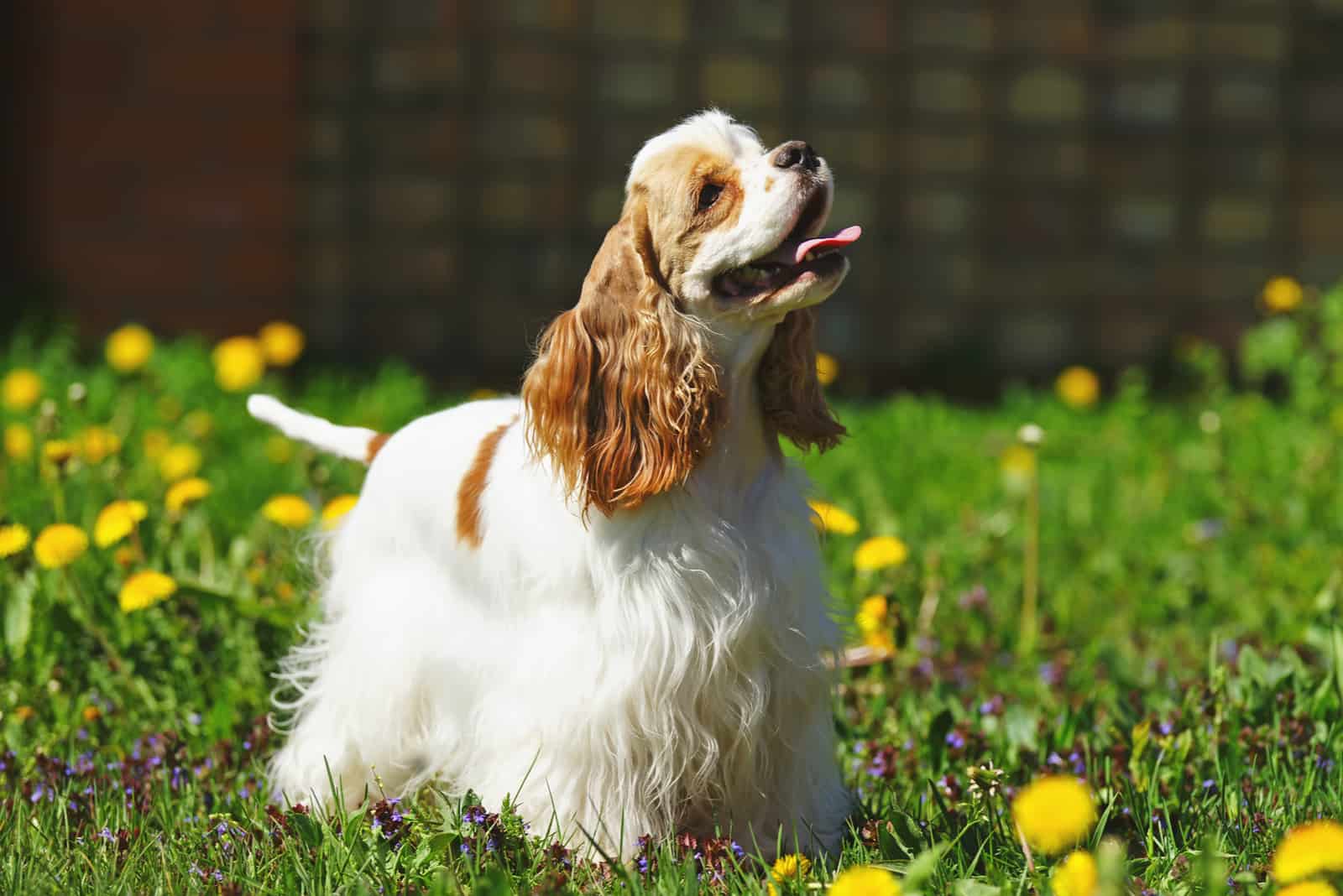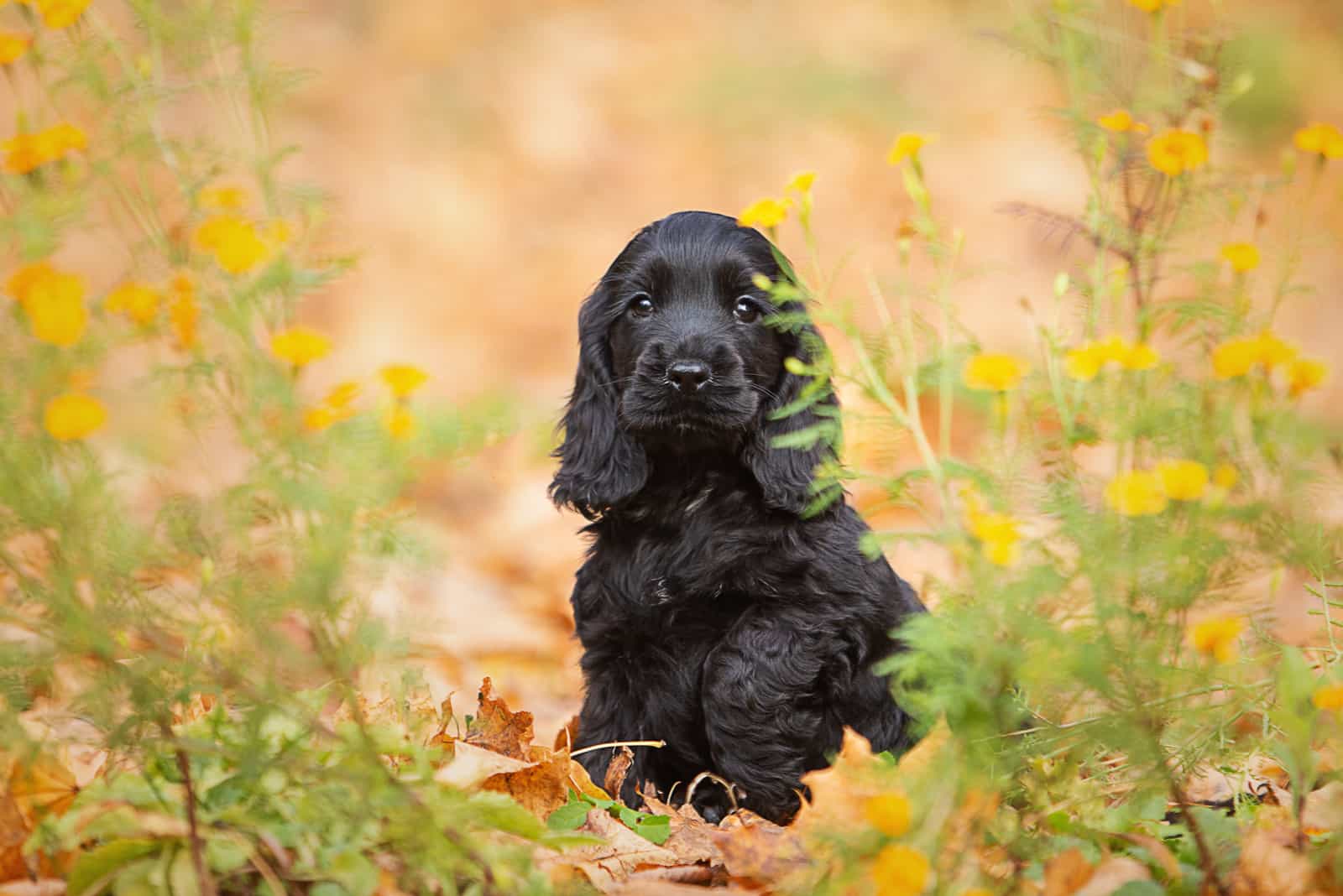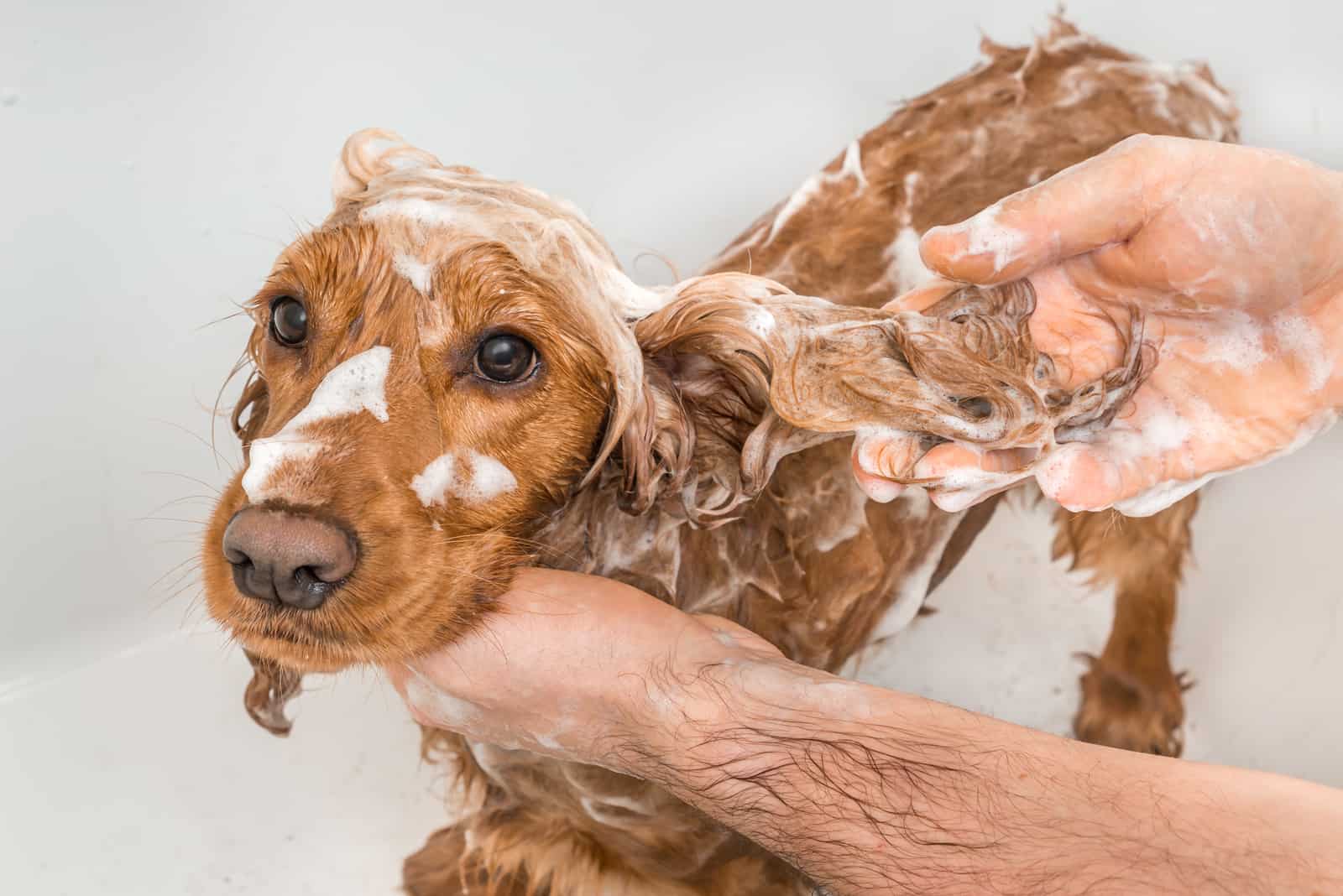First, the bad news: Cocker Spaniels are not considered a hypoallergenic breed.
However, before you throw your hands up in despair, read until the end to discover the truth about pet allergies because it is much more complicated than you might think. If you suffer from allergies and are seeking the best dog for your condition, then the good news is that all is not lost.
Join us as we ask the right questions and, more importantly, give you the answers and information to help you in your quest.
Are Cocker Spaniels Hypoallergenic Dogs?

We’ve already discovered that they aren’t, but let’s look at precisely what that means.
To begin, we need to understand what we mean by hypoallergenic. Unfortunately, the term has been misunderstood for many years. It has been used to present certain purebred and mixed breed dogs as being allergy-free. Whether this has been done intentionally or not is another matter, but it hasn’t done allergy sufferers any favors either way.
Hypoallergenic?
So, what does hypoallergenic mean? It means that you are less likely to have allergic reactions, not that something is completely free from allergens.
Allergens are proteins that enter our bodies in various ways and provoke a negative reaction. These can be in foods that we eat, pollen or dust that we breathe, or substances secreted by plants or animals.
The fact is, most allergens are completely harmless in themselves. It is our immune systems that cause the problem. When certain proteins enter our bodies, the immune system sometimes mistakes them for harmful substances. It goes into overdrive, producing histamine, which is designed to protect our bodies from potential danger.
What Is Histamine?
Histamine is an autacoid (a type of hormone) produced by the mast cells. When our body senses a foreign invader, histamine fights back. It stimulates the mucus membranes, which is why we start sneezing. It triggers the itch receptors in our skin, which is why we feel the urge to scratch. It causes inflammation, which is designed to expand the capillaries that let other chemicals in to do their work. This inflammation can also cause the throat to swell and can limit blood flow to vital organs in extreme cases. This condition is called anaphylaxis and is potentially fatal.
The trouble is, such a reaction isn’t usually unnecessary! It’s understandable when we are fighting parasites, but dog allergens aren’t harmful to us in the least.
So, what has all this to do with our question, are Cocker Spaniels hypoallergenic?
Well, the proteins that cause allergic reactions are found mostly in dog saliva and dander (dry skin flakes), and to a lesser extent, in their urine. Dander can be microscopic, floating around your home after your dog has a good scratch. When you breathe this in, your immune system starts to react.
Dog Hair Is Not The Main Problem

Photo from: @luna_the_cocker_21
Also, when the dog licks its fur, it deposits saliva, which then dries. The hairs fall off and stick to your clothes and furniture, and then you come into contact with them. The allergens find their way onto your skin, which triggers a reaction, especially if you happen to touch or rub your eyes, nose, or mouth.
This is where the main confusion lies: allergic reactions are not caused by dog hairs!
The amount of hair that dogs shed obviously has some bearing on the issue, but the actual problem lies in the proteins from saliva and dander.
Certain dog breeds have been promoted as hypoallergenic because they are low-shedders. Some are said not to shed at all. Here’s another fact: all dogs shed, even so-called hairless dogs!
Let’s recap to make sure everything is clear…
• Allergies are caused by proteins in saliva and dander.
• These proteins are allergens that stick to dog hair and are present in dry skin flakes.
• Dogs shed loose hair and dander that can trigger allergic reactions when we come into contact with it.
A dog that doesn’t feel the need to clean itself too much, doesn’t have dry, itchy skin, and doesn’t shed excessively, could be classed as hypoallergenic, as it is less likely to trigger an allergic reaction.
The Cocker Spaniel doesn’t generally fall into this category, but does that mean that allergy sufferers should avoid this dog breed?
Not necessarily! Read on to discover why.
Do Cocker Spaniels Shed A Lot Of Hair?

The most honest and truthful answer is: it depends on the dog. This is what makes the question of whether a dog is hypoallergenic or not such a difficult one to answer. Especially when people base it purely on how much the dog sheds.
As we found out above, all dogs shed to some degree. The trouble with Cocker Spaniels is that this can vary. You might be lucky enough to get one that doesn’t shed a whole lot, while your friend complains about the neverending task of vacuuming their spaniel’s fur off the furniture.
In general, they are considered a moderate-shedder with a medium or long coat. They shed all year round, but not as much as some other breeds, such as the Golden Retriever or Labrador. On top of this, they shed heavily twice a year, in spring and fall.
They have a double coat, meaning that they have a thick undercoat and a long topcoat. This acts as part of the dog’s temperature regulation system. The thick, furry undercoat keeps them warm in the winter, while the longer topcoat keeps out wind and rain.
In spring, this fur will fall out, ready for summer. The long, silky hairs of the outer coat then form a protective layer that blocks out the sun and helps to trap cool air in the thinner undercoat. It’s a system that has worked very well for thousands of years but sometimes gets messed up because of our central heating!
Also, there are many other reasons why our dogs might shed more hair. Diet, sickness, and local climate also play a role.
Without wishing to complicate matters further, it also depends on which Cocker Spaniel we are talking about, as there are two types: American and English.
Americans refer to their own version as the Cocker Spaniel, while in England, they do likewise with theirs. As you can imagine, it can become confusing as to which one we’re talking about! So, are there any real differences between the two in relation to our question, are Cocker Spaniels hypoallergenic? Actually, yes, there are! We’ll look at those separately to help us give a clearer answer.
Are English Cocker Spaniels Hypoallergenic?

Again we have to say: no, they are not. At least, they are no less likely to provoke an allergic reaction when measured against other breeds.
However, as we’ve already learned, there’s a lot of confusion surrounding this subject. Several tests have concluded that different dog breeds produce different levels of allergens. You may be allergic to one breed and not another. The fact is, all dogs produce allergens and all dogs shed, just at different rates.
Even some of the top experts and kennel clubs misuse the word hypoallergenic at times. They sometimes use it to describe a dog that is 100% allergy-free, even though they admit that there is no such thing. The problem with this is that when people see a dog elsewhere being described as hypoallergenic, they tend not to believe it! This is a shame because they could be using it in the correct sense. That is, they are talking about dogs that may be less likely to trigger a reaction.
Anyway, back to our English Cocker Spaniel. They are slightly larger than their American counterparts, with a thinner coat. They have a longer head, a wavy coat, and long ears.
They have a high prey drive leftover from their hunting-dog days.
Read More: Cocker Spaniel Growth Chart
Are American Cocker Spaniels Hypoallergenic?

Yet again, it’s a no.
Although the American Cocker Spaniel isn’t a heavy-shedder, its coat usually needs more grooming and attention than its English cousin.
As for shedding, the jury is still out! Check the online forums, and you’ll find dog lovers who complain about how much their American Cocker Spaniel sheds. Others will say that their dog is no problem when it comes to shedding.
Overall, they need more grooming than the English type because they have a thicker coat.
Although their ears are similar, they have shorter heads, but they look the same as the English Cocker Spaniel in many respects. However, they have been bred specially as companion dogs, making them particularly family-friendly (see below for more details).
Are American Cocker Spaniels Good Family Pets?

Yes! They are excellent family pets. They’re affectionate and playful and will come to you for cuddles.
As always, there are conditions attached. It isn’t just a matter of you choosing a dog that’s right for you; it’s equally important that each dog finds the right family to suit its needs and requirements. After all, you are forming a partnership that will last a lifetime.
This is a sensitive dog whose sole aim is to please you. Bear this in mind when training them, and don’t be harsh. They respond well to positive reinforcement. They want to spend as much time with you as possible and will not be happy when left alone for long periods.
Early training will help them understand what’s expected of them, and socialization gets them used to other people and animals.
The American Cocker Spaniel is energetic and needs a good 30-minute walk twice a day. They love to swim and enjoy any game that just involves the two of you, and they like to roam around and explore places – supervised, of course!
If you have a backyard, all the better, but make sure it’s securely fenced as your pup will be sure to find a way out when they feel like wandering.
Grooming shouldn’t be a chore, but you’ll need to invest some time in this. A trip to a professional groomer every few weeks or months can help you to keep your dog’s coat under control and in good condition, but on the whole, you should be able to manage.
Daily brushing is recommended, but three times a week should be the minimum. This cuts down the amount of loose hair in your home and keeps them free from matting. You should bathe them no more than twice a month, or you run the risk of drying out their skin and stripping away the natural oils in their coat.
Check their floppy ears for excess wax or gunk, as this can cause ear infections.
All Cocker Spaniels are prone to obesity, so be careful not to overfeed them and ensure they get the right amount of exercise. Only use good-quality dog food and keep unhealthy treats to a minimum.
If you can commit to all this, then you’ll have a perfect companion and a great family pet.
Still concerned about allergies? Keep reading!
Are Cocker Spaniel Puppies Hypoallergenic?

Sorry, no again! But you wouldn’t expect any other answer, would you?
You have to wonder why anyone would ask this question, as all puppies grow up pretty quickly. Whether they’re hypoallergenic or not has no bearing on this.
Many dogs find themselves being dumped in shelters because the owners say that they are causing allergies. So, would you get a pup because it’s hypoallergenic, then get rid of it once it becomes an adult?
All puppies will lose their puppy fur within a few months, as their adult coat grows in. During this time, they will shed heavily. Though we know that shedding isn’t the main issue, it might cause problems for allergy sufferers as there may be saliva on the hairs.
Are Working Cocker Spaniels Hypoallergenic?
You might be able to guess the answer by now. You’re right! The working Cocker Spaniel is not regarded as hypoallergenic.
But wait, there’s another twist: most working Cocker Spaniels don’t seem to shed as much as their companion dog counterparts. The reasons for this aren’t understood, but it’s a fact.
It could be something to do with spending more time outdoors and less time in warm houses with central heating. It could also be that a more energetic lifestyle affects the coat in ways we can’t imagine. It could also be something to do with breeding lines.
Whatever the reasons, they don’t shed as much hair. While we know that shedding isn’t the only contributing factor to allergies, it might be helpful to know that this dog won’t leave as much loose hair around your home.
Are Show Cocker Spaniels Hypoallergenic?

No, but as the owners will be taking extra care of those glossy coats and ensuring that their pooch is in top condition, there’s a pretty good chance that any allergens won’t stand a chance!
This isn’t the level of care that everyone would be expected to give, but it does illustrate how the situation can be managed.
Is A Cockapoo Hypoallergenic?
Actually…yes! These are a cross between a Cocker Spaniel and a Poodle. They have a curly coat that sheds less hair and dander than most other breeds.
The curly coat traps any loose hairs, which can be brushed out, meaning that they don’t fall around your home.
It’s a great compromise and a beautiful, affectionate, smart, but slightly crazy dog.
However, some of this will depend on which parent’s genes are dominant.
Dog Allergy Tips And Advice
Got your heart set on the Cocker Spaniel but feel that it might not be for you because it isn’t classed as hypoallergenic? Depending on how severe your allergy is, there are ways of managing the situation:
• Invest in a good vacuum cleaner – ideally, one designed specifically to deal with pet hair.
• Brush your dog regularly – regular grooming is the best way to reduce hair in your home. Use a slicker brush or pin brush, and do this frequently –every day if necessary.
• Bathe them regularly – use a good quality dog shampoo and conditioner. Brush them before bathing as this will get rid of tangles.

• Seek veterinary advice – your dog may have its own allergies! These may cause dry, flaky skin that will increase the likelihood of dander. Speak to your vet for advice on keeping your dog’s skin healthy.
• A good diet – good-quality dog food increases the chances of a healthy coat that won’t shed as much. It also reduces the risk of health problems that might cause hair loss.
• Plenty of exercise – keeping your dog fit and healthy is a good thing, but it also stimulates their mind. Smart dogs with too much energy will become listless, depressed, and possibly destructive. Their coat starts to suffer, becoming dull and lifeless, which increases hair loss.
In Conclusion

We began with the question, are Cocker Spaniels hypoallergenic? Although the answer seems to be a resounding NO, we’ve discovered that there’s more to it.
The subject of hypoallergenic dog breeds is complex and filled with misunderstanding.
You’ll find a list of supposedly hypoallergenic dogs, but now we have a better understanding of the word, we are better equipped to judge for ourselves whether this is a true assessment.
Here are some of the most popular breeds:
• The Poodle
• The Bichon Frise
• The Maltese
• The Irish Water Spaniel
• The Giant Schnauzer
• The Portuguese Water Dog
By all means, if you want a low-shedding dog that probably won’t aggravate your allergy, then choose one of these breeds. However, there are no guarantees!
Scientific studies took samples from the homes of both hypoallergenic and non-hypoallergenic dogs. They concluded that the level of allergens in each one was the same! Even more startling were the results of a 2012 study that found levels of a particular dog allergen to be higher in supposedly hypoallergenic dogs.
The best advice, if you really want a Cocker Spaniel (or any breed not considered hypoallergenic), is to get an allergy test to see exactly what you are allergic to. When some people start sneezing, they might automatically assume that it’s the dog. However, it could be that the dog brought in pollen or dust, and that is what is causing the problem.
Once you get your pooch, try some of the tips above on how to reduce the chances of a reaction.
So, are Cocker Spaniels hypoallergenic? It seems not, but it isn’t necessarily a problem.
Read Next: Cocker Spaniel Colors: How Many Shades Are There?


